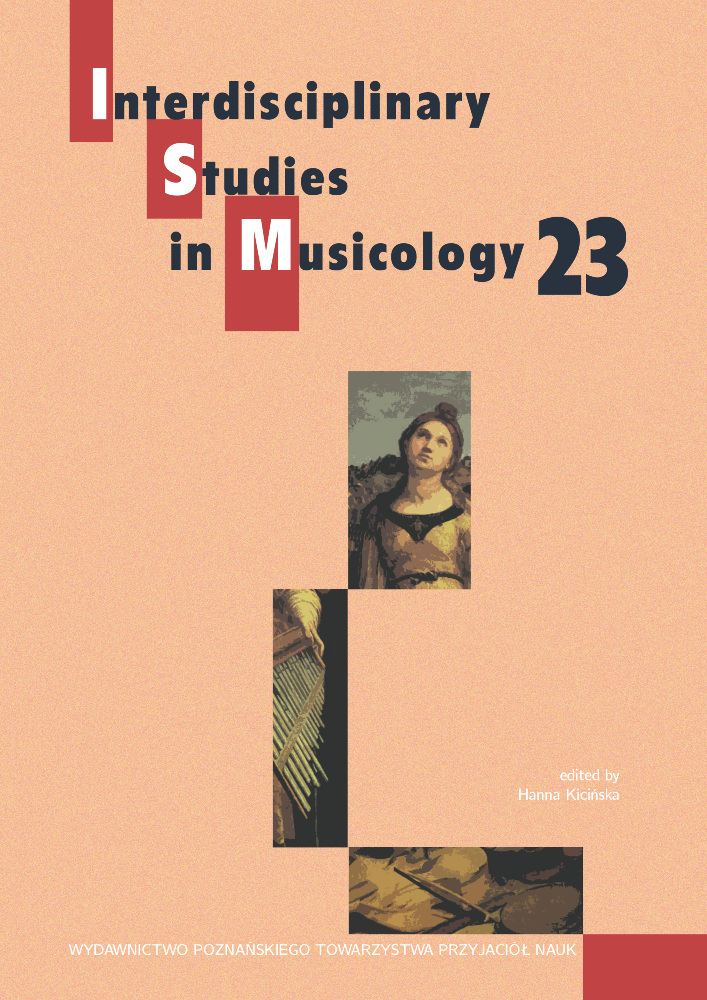Abstrakt
The purpose of this paper is to analyse Moniuszko’s Phantoms with a particular focus on the relationships between music and libretto in order to compare them later with modern strategies of performances staged recently in Polish operas and concert halls. The source-historical context referring to cultural and perceptive aspects of Phantoms serves as a starting point. The question is also raised concerning the relationship and fusion of arts constituting that intriguing work. A search for dramaturgic-theatrical aspects of Moniuszko’s work assumes an attempt to capture a so-called ‘intentio operis’, created at the intersection of Mickiewicz’s text and musical intentions of the composer. The analysis was centered on selected aspects of dramaturgy of a few performances of ‘Phantoms’ staged at the Wratislavia Cantans Festival (2017, dir. P. Passini), the Wrocław Opera, (prem. 2018, dir. J. Fret), and the Polish Royal Opera (prem. 2017, dir. R. Peryt). All stagings were an interesting attempt to reinterpret a starting form of cantata bringing it closer to theatrical work. This paper intends to answer the following questions: what dramaturgic and theatrical strategies are generated by Moniuszko’s cantata? To what extent does the cantata nature of this music-textual work contributes to new theatrical interpretations? To what extent are modern stage productions the answer to an artistic potential present in its music-textual layer? Do the new projects of its visualization and dramatisation result, even indirectly, from the structural and staging potential of the work, or whether they attempt to add new artistic ideas in order to make Phantoms more attractive as a starting, incomplete, music-textual structure?
Bibliografia
Draguła, A. (2017, September 14). Plaża umarłych [Beach of the dead]. Więź. http://wiez.com.pl/2017/09/14/plaza-umarlych/.
Lisiecka, K. (2017). Poeta w czyśćcu. Paradoksy konceptualizacji idei – [dȥadɨ] Pawła Passiniego [The poet in purgatory: paradoxes of the conceptualisation of ideas – Paweł Passini’s Forefathers’ Eve]. In Z. Bitka & A. Morawska-Rubczak (Eds.). Żywioły teatru. Ludzie – Idee – Wydarzenia. Opolski Teatr Lalki i Aktora w latach 2007–2017 [Elements of the theatre – people, ideas and events: the Theatre of the Puppet and the Actor in Opole 2007–2017], (pp. 20–35). Opole: Opolski Teatr Lalki i Aktora.
Passini, P. (2017). Nota reżyserska [Director’s note]. Narodowe Forum Muzyki. https://www.nfm.wroclaw.pl/component/nfmcalendar/event/5675.
Podsiadły, M. (2017, September 11). Klątwa nad gusłami, czyli ‘Widmo’ na Wratislavii Cantans. Rozmowa z Pawłem Passinim [A curse on the shamans, or Phantoms at Wratislavia Cantans. An interview with Paweł Passini]. Gazeta Wyborcza. https://wroclaw.wyborcza.pl/wroclaw/7,35771,22341029,klatwa-nad-guslami-czyli-widmo-na-wratislavii-cantans-rozmowa.html.
Silvert, T. (1968). Z dziejów inscenizacji ‘Widm’ Moniuszki-Mickiewicza [From the history of productions of Phantoms by Moniuszko–Mickiewicz]. In T. Silvert (Ed.). Pięć studiów z dziejów scenicznych dramatów Mickiewicza [Five studies from the stage history of Mickiewicz’s plays], Studia z dziejów teatru w Polsce 6, (pp. 83–113). Wrocław: Zakład im. Ossolińskich.
Sokalska, M. (2009). Opera a dramat romantyczny. Mickiewicz – Krasiński – Słowacki [Romantic opera and drama: Mickiewicz, Krasiński and Słowacki]. Kraków: Wydawnictwo Uniwersytetu Jagiellońskiego.
Stróżewski, W. (1986). Wartości estetyczne i nadestetyczne [Aesthetic and supra-aesthetic qualities]. In S. Sawicki & W. Panas (Eds). O wartościowaniu w badaniach literackich [On judgment in literary studies], pp. 35–56. Lublin: Redakcja Wydawnictw Katolickiego Uniwersytetu Lubelskiego.
Sułek, M. (2014). ‘Widma’ Moniuszki wobec ‘Dziadów’ Mickiewicza [Moniuszko’s Phantoms and Mickiewicz’s Forefathers’ Eve]. In M. Dziadek & E. Nowicka (Eds.). Teatr muzyczny Stanisława Moniuszki [The theatrical world of Stanisław Moniuszko], (pp. 75–98). Poznań: Wydawnictwo Poznańskiego Towarzystwa Przyjaciół Nauk.
Szwarcman, D. (2017, September 13). Przebóg! cóż to za szkarada…. Co w duszy gra. Blog muzyczny Doroty Szwarcman. https://szwarcman.blog.polityka.pl/2017/09/13/przebog-coz-to-za-szkarada/.
Timoszewicz, J. (1970). ‘Dziady’ w inscenizacji Leona Schillera. Partytura i jej wykonanie [Forefathers’ Eve in the production by Leon Schiller: the score and its performance]. Warszawa: Państwowy Instytut Wydawniczy.
Witkowski, M. (2006). Świat teatralny młodego Mickiewicza [The young Mickiewicz’s theatrical world]. Poznań: Wydawnictwo Poznańskie Studia Polonistyczne.
Ziołowicz, A. (1996). ‘Misteria polskie’. Z problemów misteryjności w dramacie romantycznym i młodopolskim [‘Polish mystery plays’: aspects of mystery in Romantic and Young Poland drama]. Kraków: Universitas.
Licencja
Prawa autorskie (c) 2023 Katarzyna Lisiecka

Utwór dostępny jest na licencji Creative Commons Uznanie autorstwa – Bez utworów zależnych 4.0 Międzynarodowe.

